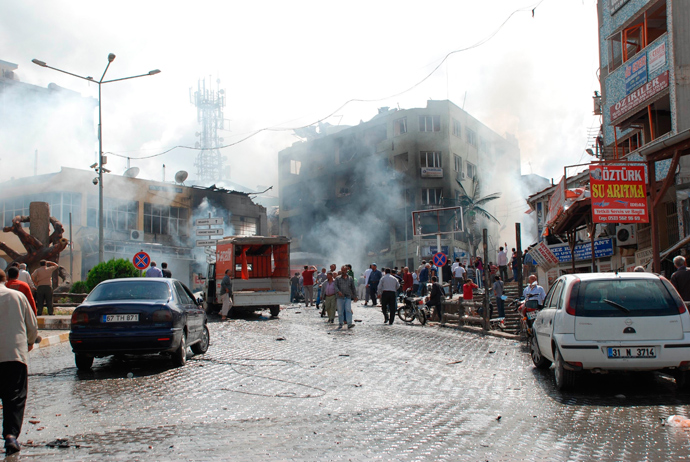The claim Damascus is behind the deadly blasts in Turkey should be taken with skepticism, believes Dr Hallinan of Foreign Policy in Focus, who says the Syrian govt is not suicidal and it makes no sense to pick a fight with the biggest NATO army in Europe.
Saturday’s deadly blasts, which rocked the Turkish city of Reyhanli on the Syrian border, fell at a significant time considering Syria’s current place in global politics, and even raise suspicion Dr. Conn Hallinan of Foreign Policy in Focus told RT.
RT: Ankara is pointing the finger at Syria – is this legitimate?
CH: The timing is certainly very suspicious – a couple of weeks ago the Syrians were accused of using poison gas, and then Carla Del Ponte from the United Nations said recently that it appears that it was the insurgency used this poison gas. Suddenly the poison gas disappears, then this bombing happens. I think you have to ask, would the Assad government be stupid enough to pick an open fight with a country on its border that has the second largest army in the North Atlantic Treaty Organization? I don’t see the sense in that; it would suggest that the Assad regime has a suicide complex, and they haven’t demonstrated any of that in the past.

I would be very, very suspicious of these charges. We don’t know what happened, we don’t know who set those bombs off. But car bombs are particular the signature device that are used by the Salafist, very extreme Islamic rebels in Syria, so I’d be very careful about pointing fingers at this point.
RT: Well, Turkey has been very open about the fact that they support the rebels at this point. Could these attacks possibly be retaliation for that?
CH: Well, again, the Turks have been doing this for the past two years, and Israel just finished bombing – the third bombing of Syria. Syria’s been very careful not to respond to any of this in the past. I think that the Damascus regime has a strong streak of self-preservation. Why at this moment, when the insurgency doesn’t seem to be doing particularly well on the ground, when the Assad army seems to be making progress in various areas of the country, would Syria then turn around and launch an attack on the most powerful army on the European side of NATO. It just doesn’t make any sense to me.
And given the fact that we’ve already seen these charges of chemical warfare largely evaporate over the past week, I would again be very suspicious here. I don’t think the Syrian government is looking for an open fight with Israel, I don’t think they’re looking for an open fight with NATO, I think they have plenty on their plate right at home.

RT: You mention this timing and it being suspicious –what’s your take on this? I mean, Prime Minister Erdogan set to go to Washington, we’ve had Kerry here in Moscow. We’ve even had Cameron in Sochi talking to Putin as well. Syria is pretty much now at the forefront of global policy. What is your take on the timing of all this?
CH: Well, I do think at this point with the Obama administration talking about stepping up and actually arming the rebels and stepping up the levels of aid, this recent bombing….essentially the French and British are pushing to end UN arm embargos so that they can begin directly supplying the rebels. I think it’s a very dangerous moment because it could actually result in a direct intervention in the civil war.
At the same time, there is also a push going on from the United States, from Russia, and from some elements apparently in the Obama administration, that is looking for some sort of diplomatic resolution to this. I think these are two tracks that are going on at the same time. As to whether or not this indicates that the US and Turkey are going for a more direct intervention, I think it’s a little early to say that, but certainly the timing here is very suspicious. And of course, there is one other thing: Many people warned that this civil war had the potential to spill over into other areas of the Middle East, and that prediction has come very true.

This almost makes me long for the days when the people blamed for these types of atrocities were actually the ones who commited them.
Almost.